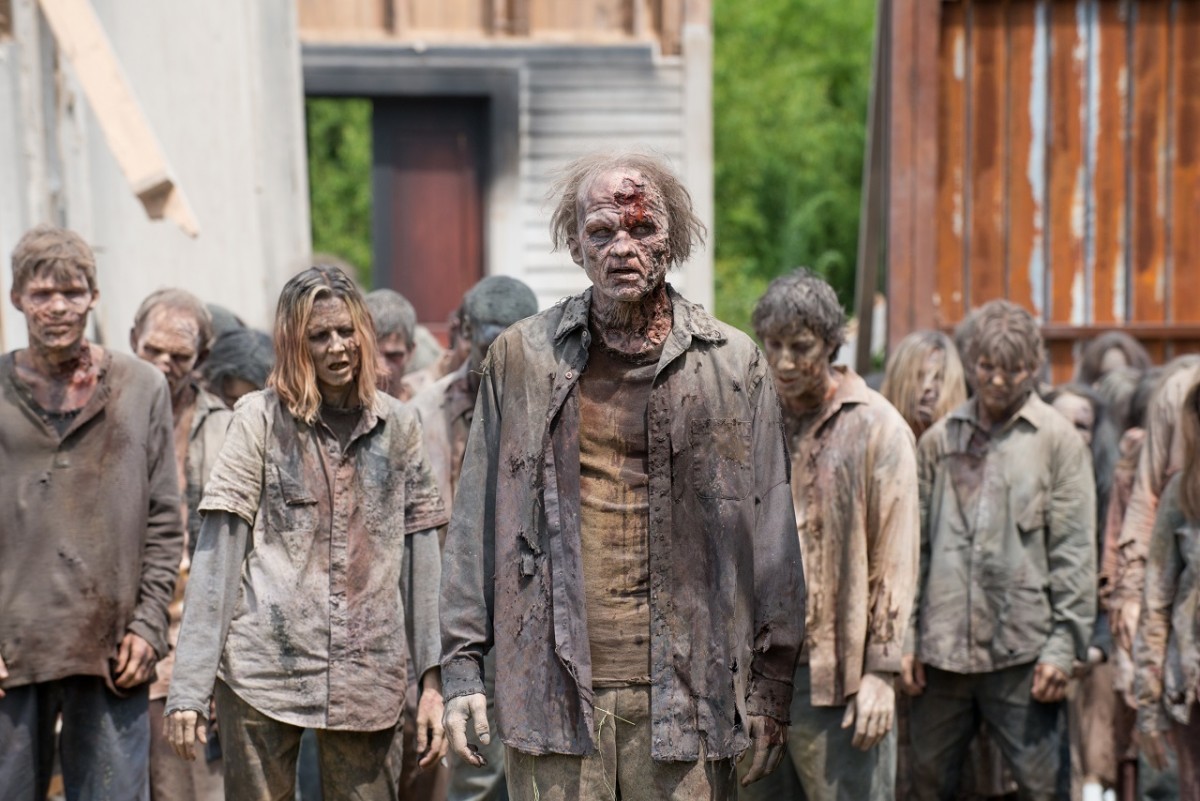The zombie plague

10 people are in a room.
1 is a zombie, and 9 are not.
Every minute, all ten people pair up randomly (forming 5 pairs). If a zombie pairs up with a non-zombie, the non-zombie becomes a zombie.
If the expected number of minutes before everyone in the room is a zombie, is given by b a where a and b are coprime positive integers, what is a + b ?
Image credit: http://www.forbes.com/
The answer is 283.
This section requires Javascript.
You are seeing this because something didn't load right. We suggest you, (a) try
refreshing the page, (b) enabling javascript if it is disabled on your browser and,
finally, (c)
loading the
non-javascript version of this page
. We're sorry about the hassle.
2 solutions
Ah, nice write up, @Arjen Vreugdenhil !
Let E n = Expected number of minutes given n zombies in the room (out of 10).
Then the answer can be found with the following set of linear equations:
- E 1 = 1 + E 2
- E 2 = 1 + ( 1 / 9 ) ∗ E 2 + ( 8 / 9 ) ∗ E 4
- E 4 = 1 + ( 1 / 2 1 ) ∗ E 4 + ( 4 / 7 ) ∗ E 6 + ( 8 / 2 1 ) ∗ E 8
- E 6 = 1 + ( 1 / 2 1 ) ∗ E 6 + ( 4 / 7 ) ∗ E 8 + ( 8 / 2 1 ) ∗ E 1 0
- E 8 = 1 + ( 1 / 9 ) ∗ E 8 + ( 8 / 9 ) ∗ E 1 0
- E 1 0 = 0
Solving, E 1 = 5 0 2 3 3
2 3 3 + 5 0 = 2 8 3
The number of ways in which ten people can be paired up is 2 5 ⋅ 5 ! 1 0 ! = 9 4 5 . After the first minute, there can only be an even number of zombies at any time.
Suppose there are eight zombies in the room. It is unlikely, but possible that the number of zombies remains 8 ; this happens when the two non-zombies pair up. The number of ways this can be done is equal to the number of ways eight zombies can pair up: 2 4 ⋅ 4 ! 8 ! = 1 0 5 . Thus the probability P 8 → 8 = 1 0 5 / 9 4 5 = 1 / 9 . The only alternative is that the number of zombies increases to 10 , with probability P 8 → 1 0 = 8 / 9 .
If E 8 is the expected number of minutes when starting with eight zombies, then E 8 = 1 + 9 1 E 8 , from which we find that E 8 = 9 / 8 .
Suppose there are six zombies in the room. The most unlikely event is that the number remains 6 ; this requires all zombies to pair up, and all non-zombies to pair up. The number of ways this can be done is 2 3 ⋅ 3 ! 6 ! ⋅ 2 2 ⋅ 2 ! 4 ! = 4 5 , giving the probability P 6 → 6 = 1 / 2 1 . It is also possible that the number increases to 8 . This requires two of the zombies to pair up with two of the non-zombies, and the remaining four zombies to pair up with each other; this can be done in 2 ( 6 ⋅ 5 ) ⋅ ( 4 ⋅ 3 ) ⋅ 2 2 ⋅ 2 ! 4 ! = 5 4 0 ways, making P 6 → 8 = 4 / 7 . The remaining case of increasing to 10 zombies has P 6 → 1 0 = 1 − 1 / 2 1 − 4 / 7 = 8 / 2 1 .
Thus for the expected number of minutes when starting with six zombies, we get E 6 = 1 + 2 1 1 E 6 + 7 4 E 8 , E 6 = 2 0 2 1 + 5 3 E 8 = 4 0 6 9 .
The case of four zombies is similar to that of six; just flip zombies and non-zombies! The probabilities are P 4 → 4 = 1 / 2 1 ; P 4 → 6 = 4 / 7 ; and P 4 → 8 = 8 / 2 1 . We get E 4 = 1 + 2 1 1 E 4 + 7 4 E 6 + 2 1 8 E 8 , E 4 = 2 0 2 1 + 5 3 E 6 + 5 2 E 8 = 2 0 0 5 0 7 .
The case of two zombies is similar to that of eight: P 2 → 2 = 1 / 9 and P 2 → 4 = 8 / 9 . Thus E 2 = 1 + 9 1 E 2 + 9 8 E 4 , E 2 = 8 9 + E 4 = 5 0 1 8 3 .
Finally, when starting with one zombie it will take one minute to create a second zombie with certainly, so E 1 = 1 + E 2 = 5 0 2 3 3 .
The answer is therefore 2 3 3 + 5 0 = 2 8 3 .